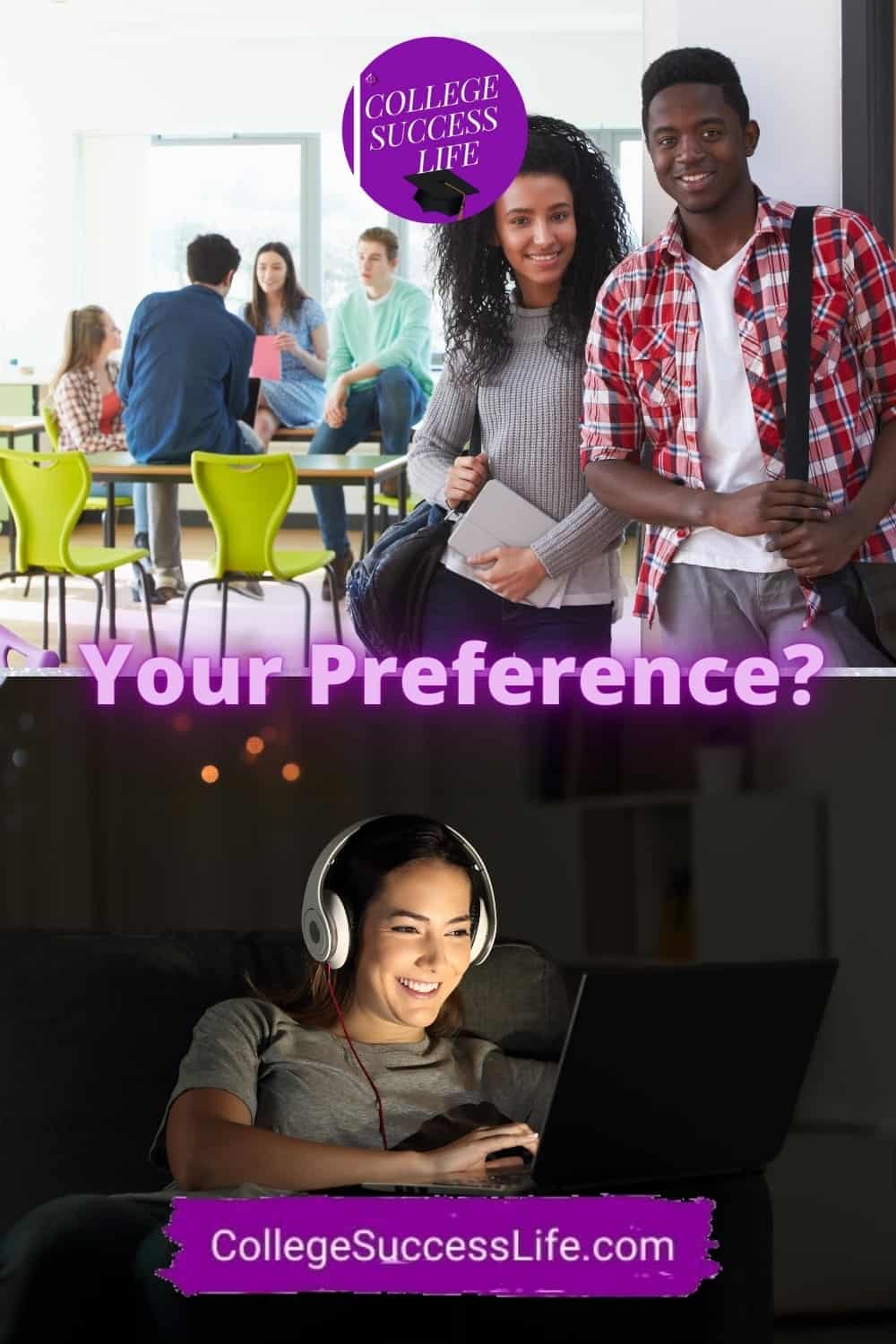
Higher Education: In-Person or Online Classes: Which Is Better?
As the world takes a turn, many education platforms have shifted from in-person towards distance learning.
However, there are still colleges that have decided to hold some in-person classes as another school year begins. Either of these two types of classes have their own pros and cons. This guide can help you decide which type of class is best for your needs.
The increasing developments in technology have made learning more accessible to everyone. Once in a while, you would see advertisements of universities offering fully online classes, pushing the narrative of flexibility, self-paced learning, and the type of education that blends into your life.
However, online classes aren’t without disadvantages of their own. There are still many things that in-person learning can offer which online classes won’t be suitable for. How do you strike a perfect balance? Below, you will find the pros and cons of online and in-person classes, as you decide for yourself what option is the best for you.

Online Classes: Pros and Cons
Advantages:
Flexibility
The traditional archetype of a college student is someone who is young, in their late teens, and free from larger adult responsibilities. This type of freedom in their schedule makes it possible for such students to learn in very structured settings such as in a conventional university.
Not long ago, online colleges have gained traction because of the flexibility they provide. Now, students don’t have to be in their late teens or early twenties to get the privilege of time to study. Students can be stay-at-home moms, part-time workers, or even military personnel who take their classes on their free schedule.
Availability of Resources
As online instructors present their syllabus at the beginning of each class, students will also tend to notice that most of these resources have their digital versions as well. These digital books or e-books can be easily accessed with a click of a button. There’s no need to carry heavy textbooks or scouring bookstores for available copies.
Another great benefit is the availability of multimedia resources in a single platform. For example, the Blackboard platform for online colleges offer links for students to access videos, slideshow presentations, audio files, and documents for learning. There’s no need for instructors to bring in projectors, set-up the class environment, or spend on handouts.
Location-Free
This is the primary reason why online classes are so attractive to many. Aside from flexibility, students desire the freedom to study not just any time they want, but anywhere they want. They can study in a cafe, while their kids are napping, during work lunch break, or even in their beds with pajamas on.
The time spent commuting, getting dressed, and preparing materials for the traditional in-person classes could be spent doing something productive when going for online classes.
Disadvantages:
Lack of Hands-On Learning
Not all knowledge can be passed using digital forms of media, at least at present. There are some technical skills that have to be learned hands-on with close guidance from mentors. Take, for example, healthcare degrees such as medicine or nursing, which can be difficult to finish online.
There are internship training hours that students need to finish in order to exhibit competency in hands-on professions, something that online classes cannot offer.
Less Structure and Motivation
Some students aren’t just built for online learning. Why? Since it is self-paced and you need to create your own structure, some end up lacking the motivation to study. Traditional classes are more ideal for such students because they need to abide by certain schedules and meet deadlines as needed.
Social Interaction
The dynamics of peer-to-peer relationships are quite different from those who take online classes versus in-person ones. With online classes, it is difficult to get to know your peers in a way you would get to know them when attending an in-person university. There’s also less peer-to-peer support and fewer opportunities for collaborations and networking.
In-Person Classes: Pros and Cons
Advantages:
The University Experience
Many students refer to their college times as one of the best years of their lives. The experiences learned, professors they have met, and students they’ve become friends with made such an impact that it influenced many areas of their lives.
This overall ‘university experience’ is what many learners are looking forward to. Although often romanticized or exaggerated in mainstream media, still, a lot of students look back at their college life with fond memories.
The university is also filled with amenities and support beyond learning. A lot of colleges offer opportunities to join organizations along with academic mentoring. Having a physical location is a plus as students have open spaces to study. There are various kinds of support as well: Access to learning resources, healthcare, as well as free drug & alcohol treatment centers.
Personalized Learning
During in-person classes, many interactions happen in real-time. If you have a question in mind, you can simply raise your hand and get the answers you need. Online classes simply do not have the luxury of this as the platform itself minimizes real-time interactions.
Hands-on activities also help students understand further concepts beyond theories. Instructors can give actual examples, create field projects, or have physical materials to use when demonstrating lessons to students.
Additionally, if you need further support, there are colleges that offer tutoring or mentoring during after school hours. This level of personalized learning has yet to be experienced in online classes.
Forming Relationships
Another advantage of in-person classes is the ability to form deeper relationships with peers. Many can say that they have met lifelong friends in college, and this is an opportunity you would miss when taking online classes. For degrees where connections and networks are crucial, simply taking online courses won’t make the cut.
You would have to form relationships with others in order to proceed in a high-level career path, something that online classes would hinder you from doing.
Disadvantages:
Time-Consuming
If you’re someone who has a lot on your plate already, in-person classes may not be the best option for you. At the very least, it can take up more than just a couple of hours of your time in the day, considering the fact that you have to commute and prepare in advance for your schedule.
Since online classes are more straightforward than in-person instruction, there’s also time spent waiting for lecturers or having idle moments of not actually doing anything. If this is something you can’t afford, then online classes would be a better fit.
Less Affordable
The general trend of tuition fees between online and in-person classes is that usually, in-person classes are more expensive. This is because it takes more resources to hold physical classes–the utilities, location, materials, and even asking professors to physically arrive at the venue would cost more compared to just doing everything digitally.
Thus, many also turn to online classes for a more affordable route.
Impractical For Others
There are people with varying life situations that limit them from completing their degrees through in-person classes. An example would be a military serviceman or spouse who moves one base to another every couple of years. If such people are taking a 4-year in-person degree, they would have to transfer credits, go to a different university, and jump through all the hoops in order to finish their studies.
Thus, in-person classes would be impractical for some people who need to be location-free.
The Weigh-In: Deciding On Your Classes
As you read through the pros and cons noted above, you would have a clearer picture of what suits your better–online or in-person classes.
In summary, if you desire flexibility, affordability, and location-proof type of learning, you should definitely go for online classes. However, if you have time in your hands while desiring the networks and opportunities of attending a college or university, then you should opt for in-person classes.
After all, it depends on your life situation, the career path you want to take, and the number of resources you have. All the best in your endeavors!
Sources:
- com – “Edtech and online learning are making higher education more accessible”.
- edu – “Flexibility of Online Education: How Flexible is it?”.
- ua.edu – “Online classes create problems for students”.
- champlain.edu – “The Cost of Online Education vs. Traditional Education”.
- com – “10 Reasons Why College Is The Best Time Of Your Life”.
Guest Contributor
Author Bio: Patrick Bailey is a professional writer mainly in the fields of mental health, addiction, and living in recovery. He attempts to stay on top of the latest news in the addiction and the mental health world and enjoy writing about these topics to break the stigma associated with them.
Website / Blog URL: http://patrickbaileys.com
Twitter: https://twitter.com/Pat_Bailey80
LinkedIn: www.linkedin.com/in/patrick-bailey-writer

A Word to the Wise...
An Academic Pearl of Wisdom
Whenever a college student faces an academic and/or social challenge, they often ask a peer or a friend first for advice.
And that’s okay.
However, resolving the issue to your best advantage often requires consulting with an academic advising professional as well.
Your academic adviser knows the campus academically, administratively, and socially.
And what they don’t know, they can point you to the person who does know. Include this strategy in your current plan for college success.
And we're always available to help as well!
Disclaimer Reminder: A college student's first line of inquiry should always be with their campus academic adviser. College Success Life Advising Sessions provide additional problem-solving options to undergraduate and graduate students for further exploration on their individual campuses. Students should always consult their assigned adviser not only during the course selection process but periodically to keep apprised of programmatic changes, testing requirements, course additions/deletions, GPA modifications, etc.
Disclosure: This page contains affiliate links, which means we will make a commission at no extra cost to you, if you make a purchase after clicking my link.









